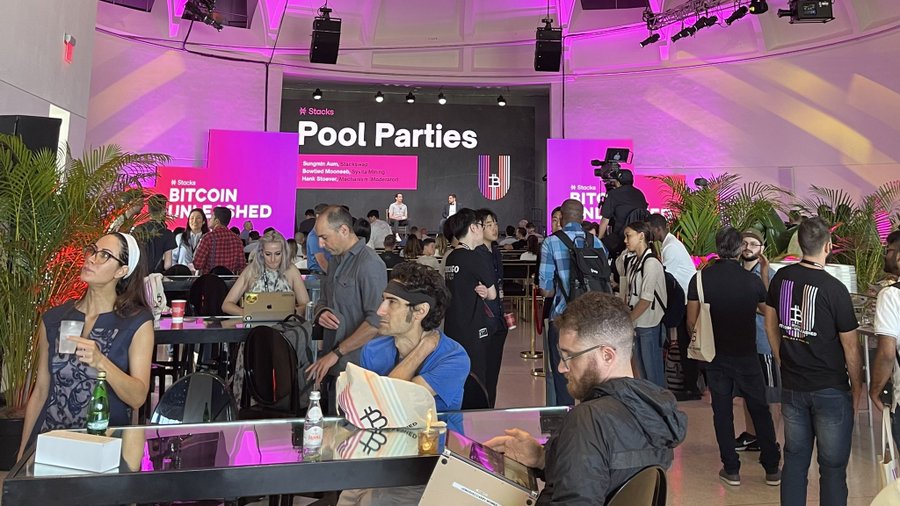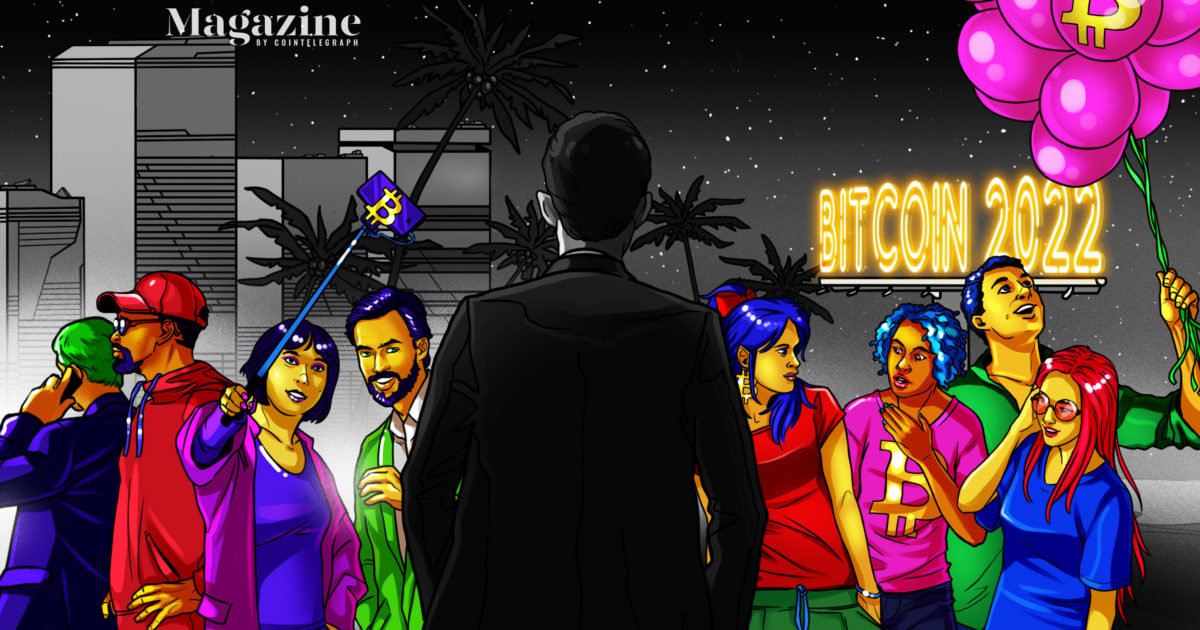As I go about the Miami conference, I wonder, Aside from some of the conference speakers, where are these Bitcoin maximalists I keep hearing so much about?
When I tell the customs official I’m going to Miami for the Bitcoin 2022 conference, there seems to be a light in the man’s eyes. He peppers me with questions, even though I’d gotten up at 5 am that day to fly, and my smartwatch is telling me that my energy levels are only at 70%. The customs official has way more interest in the subject than I can handle.
Why am I going to the conference? The philosophy of the event fascinates me — it’s a Bitcoin-only conference — with the divide between Bitcoin and the rest of the cryptocurrency world growing year by year.
I don’t go into that much detail with the customs official, though. Sometimes, when I interact with too many crypto people, I forget that everyone else has paid so little attention to this space, they still use the terms “Bitcoin” and “cryptocurrency” synonymously. If I offload onto the customs official everything that’s on my mind, he’d probably think I’m autistic or drunk (or maybe both).
Florida state of mind
I’ve always found Miami strange, but not in a bad way. Florida is known for the Florida Man meme — all the wild and wacky stuff happening in the Sunshine State like the naked man downtown who bit off someone’s face in 2012. But that’s largely because of Florida’s strong information-transparency laws. As a fellow journalist, I dream about this sometimes. Where I’m from, Canada, we have to fight twice as hard for half the disclosure. Florida is brash and loud because it’s open. In a way, Florida is America.
A Florida man was rescued after trying to ride a hamster ball to the Bahamas https://t.co/kZAMqAznEp pic.twitter.com/lklPQvIpqM
— Florida Man (@FloridaMan__) May 8, 2022
Indeed, writing in The Globe and Mail newspaper, journalist David Shribman would later say that the American center used to be California, which gave the world the movie theatre, skateboards and the linguistic filler “like.” Now, Shribman writes, America’s center is Florida. The state is the home of former-President Donald Trump, but it used to be governed by the moderate Jeb Bush — in a way encapsulating the transformation of American conservatism of the last decade. Florida is home to the “Stand Your Ground” self-defense law, the rebellion against COVID-19 mask mandates and, of course, Disneyland. No wonder this libertarian fantasy world is attracting Bitcoiners and the tech elite.
Out of California and into Florida, PayPal’s Peter Thiel has made the move. So has another member of the so-called “PayPal Mafia,” the venture capitalist Keith Rabois. Elon Musk, too, has a SpaceX launch site in Florida, and Cathie Wood’s Ark Invest has moved to the state as well. Somewhere in there is also why Bitcoin 2022, the Bitcoin-only conference that excludes other cryptocurrencies, has come to this state.
Note how so many of these tech people moving to Florida are also Bitcoin people — not just in the eyes of the mainstream who use “Bitcoin” and “cryptocurrency” interchangeably, but Bitcoin-only Bitcoin people. Thiel and Wood were both listed as speakers at Bitcoin 2022. Perhaps that’s only natural.
We’re in Miami, Bitcoin! Check out this #Bitcoin2022 recap to see what leaders, developers, celebrities, and builders did throughout the four-day event in Miami. https://t.co/mQahMG2Au4 pic.twitter.com/rEZYoPjaTv
— Cryptox (@Cryptox) April 14, 2022
During the conference, one of its hosts Natalie Brunell, speaking on the venture capitalist Anthony Pompliano’s podcast, says Bitcoin represents the “American Dream,” with its ethos of “self-determination, freedom, the idea of creating a better life for your family.” But it’s not just that. That reputation of the Bitcoin-only folks — often called maximalists — is much like that of the new America that Florida has come to represent. It’s loud. It’s big on individual liberties. The open blockchain is transparent to a fault. Thus, Bitcoin is Florida.
Or, at least, that’s one idea. On a different episode of the same Pompliano podcast, an enlightening statistic is brought up: 83% of those who own Bitcoin also own another cryptocurrency. For all of Bitcoin’s distinctness and how its identity is separate from the rest of crypto, that does not seem to extend to its holders. As I go about this Bitcoin-only event in the heart of this new America, I would wonder, How organic, really, is this maximalism sentiment running through it all?

Bitcoin to the max
It’s hardly a controversial thought to say that other cryptocurrencies cannot be truly compared to Bitcoin because they are not sufficiently decentralized — and decentralization is the entire point of the first cryptocurrency. Nor is it outlandish to say that most of the tens of thousands of alternative coins and random “blockchain” projects are either scams or, to put it politely, overly ambitious. But Bitcoin maximalists have been criticized for taking that idea up a notch.
On the second day of the conference, there is a zinger thrown during the panel called “Wartime Bitcoin.” The moderator asks what the biggest attack on Bitcoin is. Aleks Svetski, an Australian entrepreneur and author of a book on individual liberties, isn’t first in line to speak. But he seemingly gets invigorated by the question. Svetski gestures at the moderator and another speaker. “Let me go first, please,” he says. Svetski speaks with his hands:
“The attack is cryptocurrency. That’s the fucking attack.”
Me with two great men (left to right), Aleks Svetski and Mark Moss, at Bitcoin 2022 in Miami. If you don’t know them, LOOK THEM UP. pic.twitter.com/famVsYexeC
— Al Blackford (@KetoBitcoiner) April 16, 2022
The crowd cheers. Or, at least, some people do. I can hear the hoots. That is indeed quite clever, I think to myself as I watch Svetski. He further explains his thinking:
“The easiest way to Trojan Horse everyone is to pretend like you’re building something technically and architecturally similar [to Bitcoin] and add a fucking wonderboy… and then roll it out to the lemmings.”
Such rhetoric, though — those who disagree with it, disagree strongly. As the conference goes on, widely followed Twitter account Autism Capital tweets, “We find it incredibly interesting how the majority of the talks at Bitcoin Miami are people justifying Bitcoin against Ethereum…. It’s not a conference, it’s a sermon.”
We find it incredibly interesting how the majority of the talks at Bitcoin Miami are people justifying Bitcoin against Ethereum. The fear is real. It’s not a conference, it’s a sermon.
“Trust in God, do not be tempted, he will protect you, do not dance with the devil’s ether.”
— Autism Capital 🧩 (@AutismCapital) April 8, 2022
Indeed, at Bitcoin 2021, the boxer Floyd Mayweather Jr. was booed when he showed up promoting an Ethereum-based project. Mayweather obviously didn’t do a good job of reading the room. And the boos were perhaps justified, given what happened to the
Ethereum Max token he was promoting to the outside world. But what was on display at Bitcoin 2021 bordered on the religious. A Rolling Stone article on the event was headlined “Welcome to the Church of Bitcoin.”
But I didn’t go to Bitcoin 2021. I only read about it. In person, at Bitcoin 2022, there was much less of that image of Bitcoin maximalism than I expected. Aside from the conference speakers and, I guess, the guys who cheered Svetski, whom I didn’t really see, I would meet very few people who are actual Bitcoin maximalists. In fact, walking in and out of the formal talks and the rest of the conference, it seems as if I am stepping into different worlds.
Floyd Mayweather se lució con su playera de ETH en Miami Bitcoin 2021 👌😂😂 pic.twitter.com/iPrig4kQbs
— JJCampuzano.eth 🦇🔊 (@das_grasshopper) June 5, 2021
Four days in Miami
The conference at the Miami Beach Exhibition Center is altogether four days, with the first being reserved for industry, the second and third for general admission, and the fourth for a music event called the Sound Money Fest.
The way the conference is structured is that there are a few big rooms with stages for the formal events such as the talks, and while those are going on, there is a massive exhibition floor with hundreds of booths by various companies and organizations. There are also quite a few bars strewn around the place.
Everywhere, there are a lot of spectacles around — aside from the celebrity speakers like Jordan Peterson and Serena Williams. There is a cyborg bull statue outside mimicking the golden one that stands on Wall Street. Inside, on the exhibition floor, there is another bull that you can ride, a mechanical one operated by the exchange Bullish. The person who lasts the longest at the conference would win a whole Bitcoin.
Before #bitcoin After #bitcoin pic.twitter.com/06UVT3PAVS
— Documenting Bitcoin 📄 (@DocumentingBTC) April 6, 2022
The exhibition hall also has a Bitcoin volcano, referencing geothermal powered Bitcoin mining in El Salvador, and beside it is a stage with a table set up like at the sports network ESPN. Various personalities would sit around that table throughout the day and give their hot takes.
I spend part of my first day in the exhibition hall trying to look for the booth of this Ukrainian mining pool Hiveon. A publicist reached out to me earlier and said a lot about the company’s involvement in the ongoing war with Russia — Ukraine raised more than $100 million in crypto. I found that link fascinating, how crypto found its way into this big geopolitics conversation. Much of that was based on Ethereum, however, not Bitcoin.
To give you an idea of how big the exhibition hall is, though, and how absurdly bustling with activity it is, I never really end up finding the company.
With 20,000 people from around the world descending on Miami Beach, all the celebrity speakers, the global media attention — it’s hard to believe all of that came out of a white paper by a pseudonymous Satoshi Nakamoto 13 years ago.
It’s easy to see, though, that certain diffusion that happens as all ideas take hold. As Bitcoin grew, the border between it and the wider world blurred — when it became more mainstream, it also became more mainstream.
“Crypto” used to be synonymous with “Bitcoin” because there were no other coins. It was all about peer-to-peer money that can’t be controlled by any one party. When more people paid attention to it, they as much started to become influenced by that idea as they started to influence that idea. The result is the tens of thousands of different coins, the Ethereum network and its clones and competitors, the pictures of apes selling for hundreds of thousands, the “blockchain” movement hoping to tap the technology but not the coin, and the scams and the hacks. That is the term “crypto” as we know it today.
Peter Thiel making a clear declaration in Miami: the Financial Gerontocracy has declared war on Bitcoin as a revolutionary youth movement for good reason. It is thus time the revolutionary youth should understand their enemies & return fire. [Paraphrased]#BitcoinMiami #Bitcoin pic.twitter.com/UWHdy9JyrU
— Eric Weinstein (@EricRWeinstein) April 7, 2022
At the core of it all, there’s still that Bitcoin-only movement, still focused on that singular original idea of peer-to-peer digital money. But they seem to be getting drowned out. Even at this conference that is ostensibly all about Bitcoin maximalism, the exhibition hall is flush with the sort of “crypto” companies that the speaker Svetski would call the biggest attack on Bitcoin.
The Ukrainian mining pool Hiveon, for example, whose booth I eventually later found, is for Ethereum. Some at the conference are openly selling NFTs. A writer for The Defiant, a DeFi publication, even says, “I see signs that DeFi is taking root in the heart of Bitcoin.” As I go about the exhibition hall, I ask myself, Aside from some of the conference speakers, where are all these Bitcoin maximalists I keep hearing so much about?
Much later, I get somewhat of an answer. At the conference, I ran into a team from the media company WGMI Studios that has been going around interviewing attendees. Among the questions it asked is “Bitcoin or Ethereum?” They later compiled the results for me. Out of 298 people, even at this Bitcoin-only conference, 22% said Ethereum, and 11% said both. One of the WGMI studios guys, Nathan Espinosa, tells me later: “We also asked people, ‘NFTs, yes or no?’ toward the end of the event… It was quite interesting to see how [even some of who] chose Bitcoin and talked down Ethereum still supported NFTs.”
Cheese & Hayden are in Bitcoin Miami Conference meeting with other crypto’s. That’s awesome for #SAFEMOON
Making moves!!!
🧀👀🚀🌕 pic.twitter.com/fYjJKVAypQ— SafeMoon Fabo (@FaboisMe) April 6, 2022
More bull
On the third day, I see the mechanical bull again, the one on the expo floor that anyone can try to ride to win a Bitcoin. I quickly Google the tips and tricks on how to ride a mechanical bull and sign up. How hard can riding a mechanical bull be? I last four seconds.
I turn to less-physical pursuits after that. I play “Lightning” chess where players have only about five minutes to make all of their movies. I lost two games and won two games, which I think is a respectable finish.
What I truly gain from that chess experience, though, is a spreadsheet of all the side-parties going on that an opponent gave me. Among the 32 events on just the third conference day, there is a yacht party or two and a beach event by Maxim magazine — just to give you an idea of what was on offer.

ETHMiami’s party is, unfortunately, miserable with under a dozen people. I am there for no more than 10 minutes before chugging my beer and walking out.
A much better party — and one with an open bar — seems to be one by this outfit called Bad Bitch Empire, which bills itself as a private crypto investment club for ambitious women. Yet the promised free drinks turn out to be a mirage, and there are way too many people all squeezed shoulder to shoulder on a tiny rooftop patio.
I go around asking people about my observation, that, somehow, at this Bitcoin-only conference, I’ve encountered so few Bitcoin maximalists. A man who works at a Bitcoin ATM provider tells me he feels the maximalists are vocal but not necessarily in the majority. Where are the maxis at the conference? “I don’t know, but I see them only on Twitter,” he tells me. Everyone seems to agree with my observation.
Last night at the #bitcoin Miami afterparty sponsored by $Croge pic.twitter.com/HBpLTJokLN
— Comet (@CometCalls) April 8, 2022
I also bump into someone from SpaceX, but it turned out he wasn’t an attendee at Bitcoin 2022. In fact, quite few people at those side-parties were, and that’s what strikes me. One sullen British guy, who works at a crypto hedge fund, tells me that the conference is not the point. It’s the meetings you have with all the people who are in town, he says.
I guess he has a point. The conference talks are streamed online anyway. If you’re solely after the information presented, you don’t even need to leave your bedroom. It’s the human connection with the hordes of other crypto folks all in one place that is the real point of such events. So, why pay $1,099 if you can just hobnob for free at the side parties?
That night at the Bad Bitch Empire event, Bitcoin 2022 itself doesn’t really stand out among the dozens of crypto events going on around it — the Maxim beach party, the yacht gatherings, even that little ETHMiami gathering, as unspectacular as it was. It’s kind of like how, at the conference itself, its theme of Bitcoin maximalism seemed so lost among the wider crypto presence — even if, without Bitcoin 2022, there would have been none of these side events promising free drinks.
The final hours
On the last day, at the Sound Money Music Festival that is to cap off the conference, I speak to a trio of friends who are the absolute opposite of Bitcoin maximalists. One of them, a graphic designer who has gone into NFTs, an artist who goes by WHUT, proudly tells me that he holds no Bitcoin at all.
When I press him, he says, “I have, but it is like a fraction. It doesn’t really make sense to even speak about it. But I do have — my bag in Tezos is pretty heavy. I own like over 70 NFTs.” As an artist, he says, that’s what he gravitated toward. He adds that all the altcoins have advanced the crypto mission that began with Bitcoin.
Another among the trio, a recording artist named Cassius Cuvée, says:
“Mass adoption — by way of Web3 — is by NFTs. Artists are driving the adoption… You can’t have Web3 with only Bitcoin, basically.”
Whatever you make of their view, you can’t dispute that these guys believe it, and they’re not alone among the thousands of attendees of what is supposed to be a Bitcoin-only conference.
It might seem, on the surface, that the conclusion to draw would be that this Bitcoin-only conference is becoming pointless. But the other perspective is that the very existence of all these non-maximalists validates this conference’s purpose. What’s the point, after all, of spreading maximalism if everyone is already a maximalist? Maybe the hordes of non-maximalist crypto people of the past days are exactly the sort of attendees the Bitcoin 2022 organizers want.
Last main day of #Bitcoin Miami
Great work by the organizers to pull off something of this scale.
Can’t wait to come back again next year! #Bitcoin2022 pic.twitter.com/BrlrcRr5M6
— Bruce Fenton (@brucefenton) April 8, 2022
“Crypto” once meant “Bitcoin.” Now crypto has grown to become not only a world of which Bitcoin is only a small part, but also one which Bitcoin doesn’t really want to belong. To some, that’s a natural progression. To others, it’s a perversion. But to everyone, it’s a process that is plainly happening. Therein must lie the true raison d’être of the conference, its reason for being what it is: to counter that rising tide, to play the yang to the growing yin.
It’s hard to say how successful that mission statement is, but like how people say any publicity is good publicity, what matters in any endeavor isn’t so much how far you go but that you take a little step each day and do not stop. Exposing all those thousands of crypto folks to maximalist thought — maybe that in itself is a victory.




